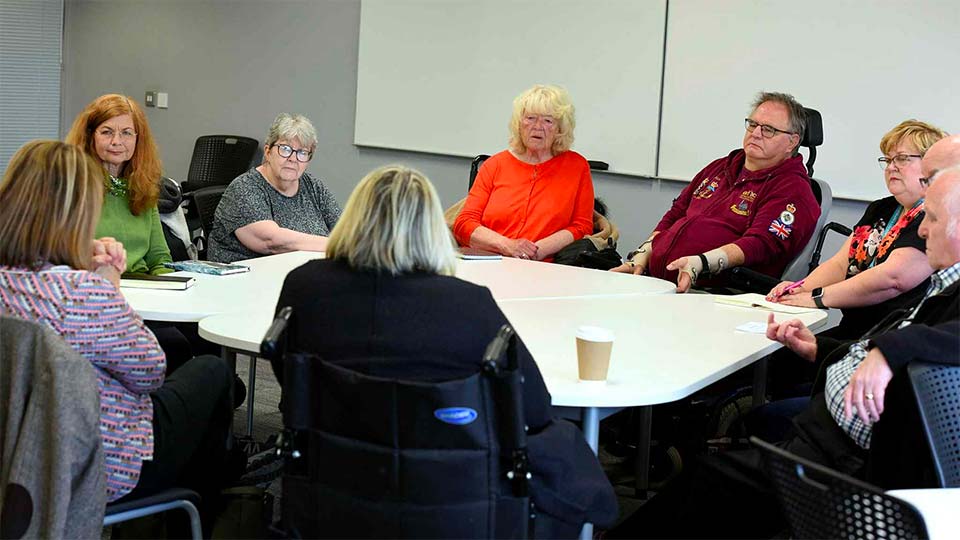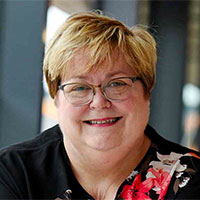Service user and carer involvement in education
We are so very proud of our service users and carers who support all aspects of our students' lifecycle from recruitment to graduation. Your shared experiences, involvement and support are valuable in enhancing the quality of our students' learning.

In the School of Health & Life Sciences, we put people at the heart of what we do. Whether it be our staff, our students or the patients we work with, we are committed to doing what we can to improve peoples' health, opportunities and lives. We offer a range of excellent courses in the healthcare disciplines, all of which develop the healthcare professionals of the future. We never forget, as we work towards this aim, what it's like to be on the other side of the service our team provide, what it's like to be someone suffering from an illness or injury, or someone who cares for them. As such, we make sure that we include these important perspectives into our research and education.
We are proud of the work we do with our service users and carers and we know from talking to our students and the professional bodies that accredit our degrees how important this team is in the development and the quality of our courses. You are an inspiring and core part of the School, and I hope you continue to be involved, or wish to be considered for this valuable role to work with us.
Dr Ann French
Dean
Why do we involve service users and carers?
All our teaching and research activities focus on enhancing the quality of care to service users. Our courses are based on service user and carer need, so of course as the main stakeholders we involve them in the design, the development and delivery of our courses.
Hearing about the experiences of real service users or carers gives students an authentic learning experience. It helps them to understand the patient experience and the effects on the wider family and friends, and to develop a person-centred/individualised approach from the start. And it makes them realise that they are dealing with real people.
The value of involvement has been recognised by the professional and regulatory bodies (including the Nursing and Midwifery Council and the Health and Care Professions Council) which oversee the education of health and social care professionals and strongly encourage educational establishments to involve service users and carers.
Why do service users and carers want to help us?
Many service users and carers tell us that their main motivation is to make a difference. They may have received or observed care that could be improved, and this has made them keen to help to change future practice. They also may have received outstanding care and want to let our students know how this made them feel.
People regard the opportunity 'to get in at the beginning' of the education of future practitioners as an ideal time to influence future professional practice. It means students on post-qualifying courses benefit from information about current issues from the public perspective. Some service users and carers also want to increase awareness of a particular condition or experience and realise that participating in student learning is a good way of doing so.
Service user and carer testimonials
I'm a retired technical director and consultant from the printing and converting industry and was diagnosed with neurological condition seven years ago. I initially agreed to share my experiences with students which led to being invited to help with interviewing for various disciplines throughout the University. I've now been involved for five years both in the University and latterly online. I think service user involvement adds to the interview process. I feel valued and enjoy the involvement.
I joined the service user carer group seven years ago to talk about my neurological condition, multiple sclerosis. As well as doing lots of activities with the students and lecturers I feel very privileged to be part of the students' journey from their initial interview right through to their final day at a celebration event at the University. Everyone in the School made me feel like a very valued member of the team, and I personally find the sessions very therapeutic.
As a person with a long-term degenerative neurological condition, multiple sclerosis, being part of the service user carer group is so interesting. Being part of the students journey is fascinating, seeing someone grow and develop to be the professional that is key to my care now and in the future. I've worked with students on various courses and disciplines describing how, as a service user, good practise is essential to good care and how poor practise can affect not only the patient but staff morale and therefore ultimately retention. The relationship that grows from meeting likeminded individuals in the group is vital to the excellent work we do with University staff. Catherine arranges everything and her support is vital to the smooth running of the group. We would love you to join us.
I became involved with the School around 1998 when a forward-thinking lecturer asked me to come in and talk/tell my story to first year occupational therapy students. Telling my story for the first time was cathartic it dramatically changed how I viewed myself and consequently empowered me to build a much better relationship with all medical practitioners who have treated me in the past and still treat me today. Over the years I have often asked myself do I make a difference? A indicative quote from a first year nursing student after I had talked to her group answered that question for me. She said 'Thank you for sharing your experiences they will help me to develop into the best nurse I can be'.
I have been asked over the years Is it difficult to join the group? Answer, no.
Do we need more members? Answer, always.
Can I make difference? Answer, yes.
We all have a story to tell and I am and will be forever grateful I got the opportunity to tell mine.
I'm a father of four and grandfather of one. After leaving school with very little in the way of qualifications, I started an apprenticeship with a local company, but the company went bust so I joined the British army, the Royal Army Medical Corps, a special airborne unit. I served over four years and was medically discharged. I did my civilian nursing training in 1985, but in 2000 had a motorcycle crash when a drunk driver hit me head on. This put an end to my nursing career.
I started coming into the University in 2018, and I love it as it gives me the chance to share my experiences with the students; mainly my experiences with my health and how it affects me and my family. I am looking forward to how the next couple of years will develop, and to see how the School of Health & Life Sciences grows.
I have been a carer for my wife who had a stroke 13 years ago. I got involved with this group nine years ago through my involvement with an organisation called Carers Together basically to explain the role of unpaid carers to students. I stay involved because I love the feedback I get from the students when I tell my story, they hear the stories first-hand from both service users and unpaid family carers and this can only benefit them and patients in the future.
Who can help?
Anyone who has recent experience of being at the receiving end of services or of caring for others is all that is needed:
- have you recently been in hospital?
- have you an illness or disability?
- are you an unpaid/family carer?
- have you used health, social care or support/rehabilitation services?
You do not need specific skills.
What's in it for me?
It was an enriching experience, I learned a lot.
Service users and carers who already work with us have shared their experiences and views:
- I'm making a difference.
- Experienced or observed exceptional care, or conversely care that is not so good means I can make students aware of the issues that constitute good care so that future practice can improve.
- Sharing my lived experience as being on the receiving end of services is something only service users and carers can do.
- I can share what it feels like to be treated kindly and with respect or to be treated in a brusque or condescending way.
- I know what it's like to live with a condition such as multiple sclerosis or cancer or to experience drug addiction or domestic violence.
- I can tell you about having a learning disability or caring for someone with a learning disability.
- Encouraging students to try to 'put themselves in my shoes' will help them to practice and deliver services in a more appropriate way.
- It's an opportunity to increase awareness of a particular condition or experience.
- I think we gave them food for thought - they seemed to get a lot out of the experience.
Raising the status of issues that matter to the public, service users and carers
The more they speak to and listen to us the better their compassion and understanding will be in their work.
You can also use your experience in a more general way to make sure that the issues that matter to the public, such as communication, attitude and giving information in the right way and at the right time, are at the heart of our students' education.
You might also use your experience to help us to select the right kind of students who have the potential to become the kind of health or social care professionals that the public needs.
We know talking about your experience or, using your experience more generally, can improve your wellbeing and increase confidence.
How can I get involved?
There are many different ways - choose what you think best suits you, or just ask for more details:
Classroom activities (group work, relating own experiences, induction)
Recruitment and selection procedures (including interviewing)
Assessment of students (giving feedback on learning activities/presentations)
Curriculum development, course review and course approval
Consultation and focus groups
Research
For all our activities we aim to provide you with the necessary preparation so that you feel confident about participating. For any kind of involvement we will discuss your role so that you are fully informed before you decide whether or not you wish to take part.
There is no set time commitment for involvement - it is up to you to give as much or as little time as you want.
Training
All service users and carers are required to complete equality and diversity training. This is an online package and will be sent to you once you have registered on our database.
Other training will be given as and when required.
Support for you
 The School of Health & Life Sciences has a dedicated Coordinator for Service User and Carer Involvement, Catherine Hutchinson.
The School of Health & Life Sciences has a dedicated Coordinator for Service User and Carer Involvement, Catherine Hutchinson.
Catherine's role is solely to work with service users, carers and staff at Teesside University.
If you would like to know more or would like to join our group, please contact Catherine Hutchinson on 01642 738798 or c.hutchinson@tees.ac.uk.